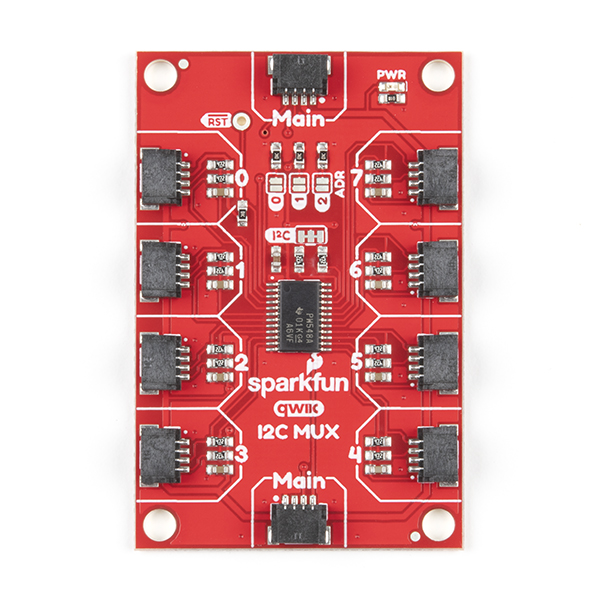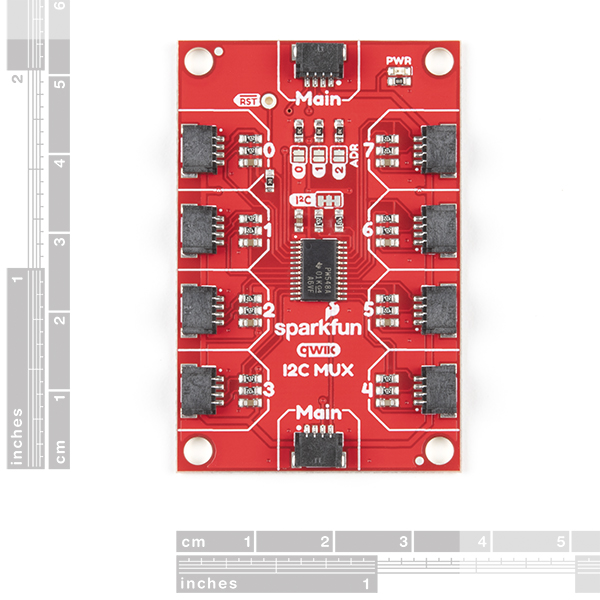AED 75.00
Description
The SparkFun Qwiic Mux Breakout conquers a common I2C roadblock: conflicting device addresses. This nifty multiplexer acts as a bridge, allowing up to 8 I2C devices with identical addresses to coexist on a single bus. The magic lies in its 8 configurable addresses, effectively creating virtual I2C lanes for each device. Universally compatible with both I2C and SMBus protocols, it seamlessly integrates with a vast range of sensors and I2C modules. Furthermore, the Qwiic Mux offers additional features like voltage translation for different power levels and hot-swapping for convenient device insertion/removal. This makes it a powerful asset for I2C enthusiasts working on complex sensor networks or projects requiring expanded I2C device connectivity.

- Bidirectional Translating Switches: Facilitates communication between multiple I2C devices.
- Configurable Addresses: Offers eight jumper-selectable addresses for customization.
- I2C Compatibility: Supports I2C bus and SMBus, ensuring compatibility with a wide range of devices.
- Active-Low Reset Input: Allows resetting of the device via a dedicated input.
- Voltage-Level Translation: Enables voltage translation between different buses, accommodating various voltage levels (1.8V to 5V).
- Hot Insertion Support: Supports hot insertion of devices without affecting functionality.
- Low Standby Current: Ensures energy efficiency during standby mode.
- Wide Operating Voltage Range: Operates between 1.65V and 5.5V, suitable for diverse applications.
- ESD Protection: Provides robust protection against electrostatic discharge, ensuring reliability.
- Temperature Range: Operates reliably in temperatures ranging from -40°C to 85°C.
Specifications
- Operating Voltage: 1.65V - 5.5V
- Operating Temperature: -40°C to 85°C
- I2C Address: 0x70 (default), configurable up to 0x77
- Connectors: 10x Qwiic connectors, 2x Pass-through connectors (daisy chain)
- Channels: 8x bidirectional translating switches
Pinout:
The SparkFun Qwiic Mux Breakout doesn't utilize individual pins for specific functions like traditional I2C breakouts. Instead, it functions as a multiplexer for existing I2C devices:
- I2C Interface: It uses the standard I2C protocol (SCL, SDA) for communication with the microcontroller.
- Qwiic Connectors: It offers 10 Qwiic connectors (5 on each side) for daisy-chaining multiple I2C devices or connecting them to the microcontroller via a Qwiic cable. These connectors follow the standard Qwiic pinout with:
- Yellow wire - SCL
- Blue wire - SDA
- Red wire - 3.3V
- Black wire - Ground
- Pass-Through: It includes 2 additional pass-through connectors specifically for daisy-chaining multiple Qwiic Muxes if needed.
Applications
- Sensor networks: Manage and communicate with multiple sensors on a single I2C bus.
- I2C device expansion: Connect more I2C devices than your microcontroller can handle natively.
- Prototyping: Easily test and integrate various I2C devices during development.
Dimensions

Documents:
- SparkX (R&D)
- Version 1.0
- Version 1.1
- Schematic (PDF) (v1.1)
- Eagle Files (ZIP) (v1.1)
- Board Dimensions - (v1.1) Dimensions are in inches and the mounting holes are for M3 screws (x4).
- Product GitHub Repo (v1.1)
- Product Video
- Datasheet:
- Arduino Example Code:
- TCA9548A Python Package
- Product GitHub Repo
- SparkFun Product Showcase: Qwiic Mux
- Qwiic Landing Page
Package Includes
- 1x SparkFun Qwiic Mux Breakout